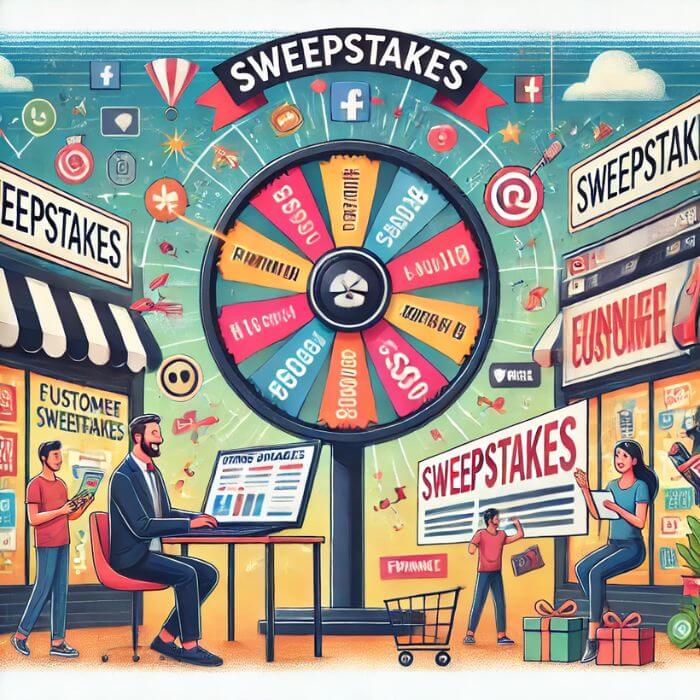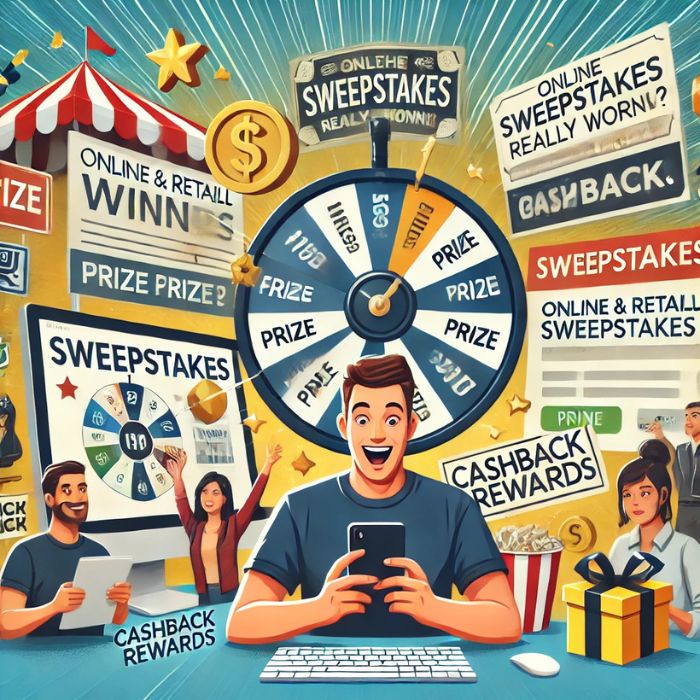Businesses around the world use sweepstakes as one of the most popular ways to get people to buy their products. They often ask for personal information or in exchange for a purchase, or for something that people can win for little or no money. Since contests are easy to enter and offer a chance to win, it’s no wonder they’ve gotten so much attention. Still, the question remains: Do Sweepstakes Really Work? Are they effective for companies? And more importantly, do they really help people?
This article will take an in-depth look at sweepstakes, including how they work, how well they work as a marketing tool, and what problems they can cause for both consumers and businesses.
Table of Contents
What are sweepstakes?
With sweepstakes, people can enter a contest or promotion and win prizes by randomly drawing names. When you enter a lottery, you don’t have to be skilled at anything; winners are chosen randomly. Typically, all you have to do is give them your contact information to join, which can help them reach more people.
Sweepstakes prizes can vary greatly. Some may offer small prizes like gift cards or branded merchandise, while others may offer larger prizes like cars, vacation packages, or even cash. Most sweepstakes rules make it clear that you don’t have to buy anything to enter. However, some businesses may offer a “buy to enter” option, which can help them make more money during the sweepstakes.
How do sweepstakes work?
Most sweepstakes follow a basic structure, but specific details can vary from campaign to campaign:
Entry Procedure: To enter most contests, people simply need to fill out a simple form with their name, email address, phone number, and sometimes some other information about themselves. Some sweepstakes will let you enter multiple times if you share a link to the ad or make a purchase, which increases your chances of winning.
Eligibility: Some contests have rules about who can enter, such as being a certain age or living in a certain country.
Prize pool: Sweepstakes prizes can be very simple or very fancy. Businesses often advertise these prizes heavily to get people to enter.
Winner selection: Winners are usually chosen randomly, but some raffles use different methods to choose winners, such as a draw or public vote.
Promotion and sale of merchandise: Businesses often run contests as part of a larger marketing plan. This can include things like social media advertising, email marketing, and in-store sales.
Set of rules and regulations: There are certain rules and laws that all sweepstakes must follow to make them fair and legal. With these rules, sweepstakes are kept within the law, which is especially important because winners are usually chosen randomly and the prizes are worth a lot of money.
Do Sweepstakes Really Work for Businesses?

Sweepstakes can be a great way for businesses to generate interest in their products, increase brand visibility, and increase sales. Businesses can use them to:
Generate leads and grow their customer base
Businesses use contests to gain new customers, which is one of their main goals. People who enter sweepstakes usually give businesses their contact information, which they can use for future marketing. This is very helpful for businesses that want to gain more customers or reach new people.
For example, a business might use a contest to sign up for their email list. Those who enter can be added to their newsletter, promotional emails, or programs specifically designed for them. Over time, these leads can turn into actual customers who make a purchase.
Increase brand visibility
Businesses can get more people to enter a sweepstake if they promote the sweepstakes through various channels, such as social media, email, and even influencers. People who are excited about the prize will often tell their friends and family about the contest. This will naturally help spread the word. It will help the brand reach more people without the company having to do much more.
Increase engagement and encourage repeat purchases
You can also help people connect with a brand through sweepstakes. For example, giving customers an extra chance to win with each purchase can encourage them to buy more frequently. A business can use the opportunity to showcase new products or special deals that will increase the likelihood that people will buy from them again in the future. This works especially well if the contest is related to a holiday deal or a new product release.
Build customer loyalty
With the right setup, contests can also be used to keep current customers coming back. For example, a business can host a contest only for people who have already purchased something, to thank them for their business. This strategy helps keep current customers interested in the company and encourages them to buy more.
Cost-effective Marketing
Compared to other types of advertising, contests can be quite inexpensive to run. Prizes and advertising are the most expensive, but they can be increased or decreased based on the business’s budget. Many times, the value of more participation, brand recognition, and potential sales far outweighs the cost of prizes and advertising.
Do sweepstakes really work for consumers?

As a consumer, you may see sweepstakes as a fun and easy way to win free stuff. However, there are both pros and cons to entering sweepstakes.
Benefits for consumers:
Opportunity to win valuable prizes: The most obvious reason to enter sweepstakes is the chance to win something valuable, such as a car, a trip, or a lot of money. People sometimes enter sweepstakes just for fun or in the hopes of winning something they otherwise wouldn’t be able to afford.
No entry fees: You can enter most sweepstakes without buying anything. This is a good choice for those who want to participate without spending any money.
Fun and anticipation: Entering and waiting to see if you win can be fun. It makes everyday tasks more fun, especially if you always enter contests.
Opportunities to get deals and offers: Many contests have additional benefits, such as discounts, special deals, or the chance to win prizes. Companies sometimes offer special deals only to people who sign up as an incentive to do so.
Disadvantages for consumers:
Low odds of winning: The biggest problem with sweepstakes is that the odds of winning are usually very low, especially in big drawings that attract a lot of attention. Some people may be annoyed by this, but it is important for people to remember that entering sweepstakes is more about the experience than the chance to win.
Collection of personal information: In order to enter many contests, people are required to provide personal details such as their email address, phone number, and even mailing address. Obviously, this makes people concerned about their privacy because they may receive spam emails or even fall victim to scams.
Fraudulent Sweepstakes and Scams: Not all giveaways are real. Some scammers use contests to solicit personal information or sell items. People should be cautious and only enter sweepstakes run by reputable companies.
Time and Work: Contests are usually free to enter, but they can be time-consuming. Some sweepstakes may require people to fill out surveys, share items on social media, or sign up for newsletters, which can seem like a lot of work for a small chance of winning.
Are Sweepstakes a Sustainable Marketing Strategy?
While sweepstakes can be a great way to get new customers, build brand awareness, and sign up for more information, they work best when they’re part of a larger marketing plan. They can help you reach your short-term goals, but if you rely on them alone, they may not be able to support your long-term growth.
A sweepstakes can get people excited and interested in your business, but an effective long-term marketing plan should also include a mix of other strategies, such as targeted advertising, customer loyalty programs, content marketing, and relationships with influencers.
People who enter sweepstakes can have fun and get a chance to win prizes, but they should be careful, especially when it comes to their privacy and the potential for scams.
Frequently Asked Questions:
Is it possible to win a raffle, or are they just a way to encourage people to buy something?
While contests are mostly used for advertising, there are real winners. The important thing is to only enter genuine contests and know what the odds are.
What types of lottery scams are common?
Phishing schemes, fake alerts, and requests for money to claim prizes are all common types of scams. Always make sure the prize is real.
Do I have to pay taxes on the prize I win in a sweepstakes?
Yes, in most countries, winnings in raffles are taxed as income. Talk to a tax professional to find out what you should do.
Why is running a sweepstakes good for business?
Companies use sweepstakes to learn about their company, get information about their customers, and increase sales by getting people more involved.
In Conclusion:
Sweepstakes have the potential to work, but it depends on how they are set up and what the goal of using them is. They can be a great way for companies to get new leads, increase awareness of their brand, and engage customers more. They offer people a fun opportunity to win great prizes, but they should be aware of the potential and risks that come with it, especially when it comes to their privacy.
Ultimately, sweepstakes work best when they are used strategically and carefully, balancing the fun of entering with realistic goals for both the company and the customer.

